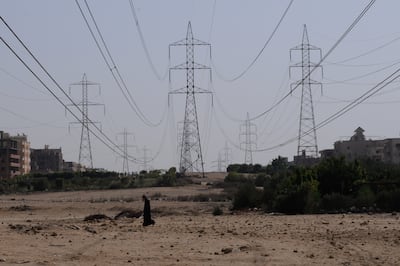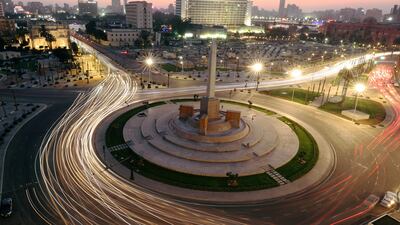Egypt will introduce a programme next week to reduce electricity consumption in an effort to increase natural gas exports and boost foreign currency reserves, Egyptian Prime Minister Mostafa Madbouly said.
“The more we reduce electricity consumption, the more hard currency we save,” Mr Madbouly said on Tuesday.
The new measures will include cutting off electricity in government buildings at the end of official working hours, stopping outdoor illumination of public squares and limiting lighting at large sports complexes.
Directives will be issued for shopping malls to set central air conditioning at temperatures of 25ºC or higher.

The government will give priority to electricity production plants that use less natural gas and produce power in larger volumes, including the three stations established in co-operation with German company Siemens.
Mr Madbouly said these measures are necessary in light of the Russia-Ukraine crisis, as well as the “unprecedented rise in the prices of fuel, materials and basic commodities”.
Since Russia invaded Ukraine in February, Egypt has suffered soaring inflation and falling foreign currency reserves.
Egypt’s annual urban consumer inflation accelerated to 13.6 per cent year on year in July, from 13.2 per cent in June, data from the country's statistics agency Capmas showed on Wednesday.
Foreign currency reserves have fallen from $37 billion in March to $33.14bn at the end of July, according to Central Bank of Egypt figures.
The Arab world’s most populous country is trying to balance reducing the “burden on the Egyptian citizen” while dealing with a mounting import bill caused by the doubling, or sometimes “more than doubling” of commodity prices, Mr Madbouly said.
Last month, Egypt said it would be increasing the number of beneficiaries of government programmes designed to cushion its neediest against the economic effects of the Russia-Ukraine war to more than 20 million.
Although natural gas prices are increasing significantly around the world, Mr Madbouly said the government would postpone a decision on increasing electricity prices until the beginning of next year.
The Egyptian state effectively subsidises electricity for citizens consuming the first segments at half the value of its cost to the state.
More than 60 per cent of Egypt’s production of natural gas goes to electric power stations. Therefore, saving on electric power will help maximise natural gas exports.
Every million thermal units provided locally at a price of $3 can be exported at $30, Mr Madbouly said.
Since October, the government has switched to operating some power plants with mazut, a heavy fuel oil, instead of natural gas. That has helped to create an export surplus, averaging between $100 million to $150m a month, he said.
Egypt had been a net importer of natural gas for several years to meet domestic consumption demands. It returned to net exporter status in 2019, largely the result of the discovery of offshore natural gas field Zohr in 2015, considered the largest field in the Eastern Mediterranean region.
Europe’s gas crisis, caused by supply disruptions triggered by the Russia-Ukraine war, has given a boost to Egypt’s liquefied natural gas (LNG) exports.
In June, Egypt, Israel and the European Union signed a preliminary agreement to increase LNG sales to Europe.


